Pianist / Conductor Justus Frantz
A Conversation with Bruce Duffie
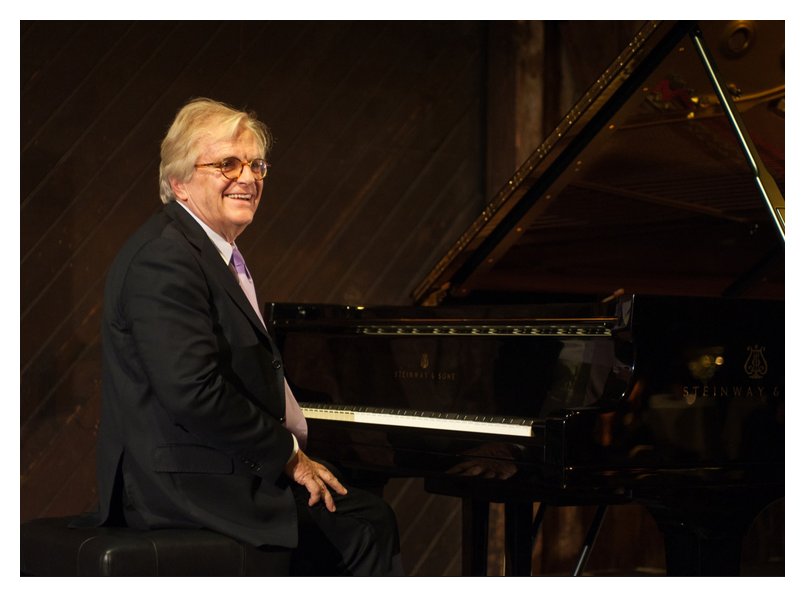
Justus Frantz is an internationally acclaimed German pianist and conductor.
He began playing piano at the age of four. Professor Eliza Hansen early recognized
his talent fostered it. Later the young musician studied conducting under
Wilhelm Kempff.
At age of 23, Frantz became the youngest musician ever to be granted a scholarship
by the Studienstiftung des Deutschen Volkes (German National Scholarship
Foundation). In 1967 he won a prize at an international music competition
held by a famous German TV channel, which marked the beginning of his international
fame.
In 1970, he rose into the group of first-class pianists with the Berlin Philharmonic
Orchestra conducted by Herbert von Karajan. He celebrated his US debut five
years later with the New York Philharmonic Orchestra conducted by Leonard
Bernstein, whose musical ideals he continues to adhere to. Bernstein's dream
of an international, young and professional orchestra inspired Frantz to
found the Philharmonia of the Nations in 1995. As the chief conductor, Frantz
works throughout the world with the constantly updating cast of the orchestra,
also discovering new names. He does a lot to cultivate young talents, and
therefore his schedule includes frequent auditions, which gives young musicians
a great chance to start an international career. Among the musicians who
were first introduced to the audience by Justus Frantz are violinists Maxim
Vengerov, Midori and Joseph Lendvay, pianist Evgeny Kissin, and composer
Martin Panteleev.
In 1986 Justus Frantz founded the Schleswig-Holstein Music Festival and was
its director for nine years turning it into one of the world's greatest music
forums.
Justus Frantz has been awarded several television prizes of high prestige
for the highly successful TV programs that he has produced including the
famous Achtung! Klassik ("Attention! Classical music").
Since 1989, Frantz has been a special ambassador for the UN High Commission
for Refugees and in the same year he received the German equivalent to the
OBE, the Grosse Bundesverdienstkreuz.
Frantz is the chief conductor of the Philharmonia of the Nations and works
on a regular basis with renowned orchestras all over the world, such as the
Mariinsky Orchestra in St. Petersburg, the Great Symphony Orchestra Moscow,
the China Philharmonic Orchestra, the KZN Philharmonic Orchestra Durban,
the Georgian Chamber Orchestra, Sinfonia Varsovia and many others.
Every summer Frantz invites musicians from all over the world to his music
festival Finca Festival Frantz & Friends in Monte Leone.
|
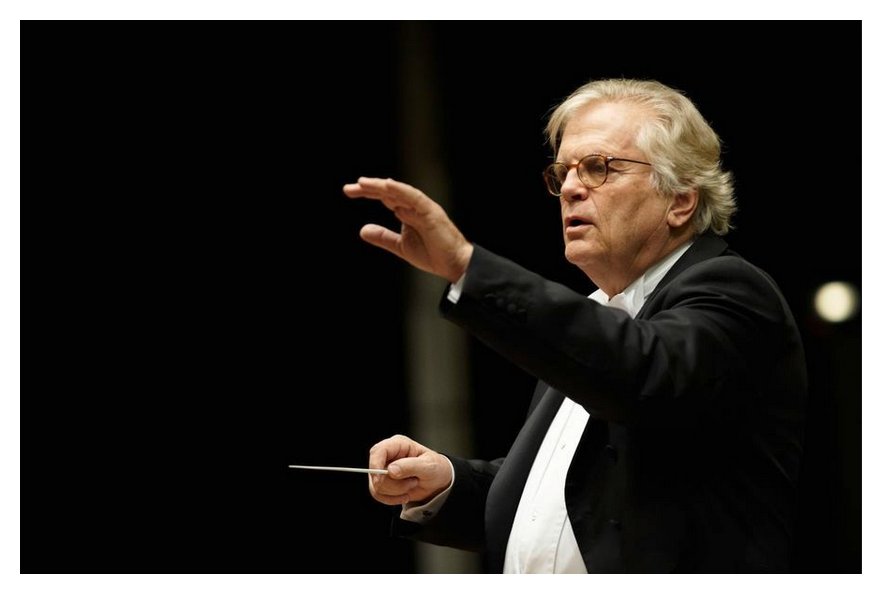
Justus Frantz was in Chicago with the Salzburg Mozarteum Orchestra in February
of 1991, marking the 200th anniversary of the composer’s death.
The concert held two concertos, #20 in
d minor, K. 466, and #21 in C major,
K. 467, as well as the Jupiter
Symphony, all led by Hans Graf.
The pianist arrived a couple of days ahead of the performance, and we arranged
to get together for an interview. His English was quite good, though,
as usual with Europeans, his sentence-structure was often of the old-world
variety. I've straightened out most of the syntax, but some charming
varieties and usages have been left in where they do not interrupt the flow
of the words. Names which are links refer to my interviews elsewhere
on this website.
As we sat down for the conversation, we were looking at some CDs he brought,
including one that was quite special . . . . . . . . .
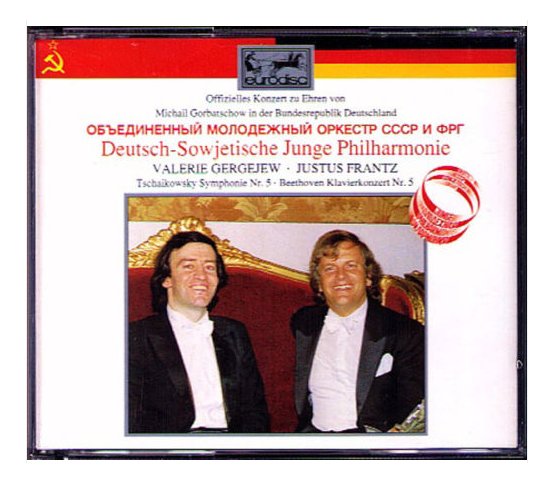 Justus Frantz: I founded that orchestra, the German-Soviet
Youth Orchestra. It’s a very good orchestra. You see, we were
always enemies, and suddenly we were together with the music, and it was
such an enjoyment. Everybody tried to be better. The recording
is of the whole concert, even with the National Anthems! Being a concert
we have no chance to repair it! [Both laugh]
Justus Frantz: I founded that orchestra, the German-Soviet
Youth Orchestra. It’s a very good orchestra. You see, we were
always enemies, and suddenly we were together with the music, and it was
such an enjoyment. Everybody tried to be better. The recording
is of the whole concert, even with the National Anthems! Being a concert
we have no chance to repair it! [Both laugh]
Bruce Duffie: Do
you prefer making records in live concerts?
JF: Somehow the
last times I only did live concerts. I did one with Vladimir Spivakov
and the Moscow Virtuosi, a middle Mozart concerto, and I’m very proud of
it. I’m also proud of Valery Gergiev, who is
a wonderful conductor, to do this Beethoven. I remember in the beginning
I really had to fight for the right way because he played it a little bit,
in my opinion, like Tchaikovsky. Maybe I played Beethoven too
German for him, and so after a while we met and we both are very happy with
the product of this Fifth, Emperor Concerto.
BD: You say you’re
looking for the right way. Is there only one right way to play any
piece of music?
JF: Of course there
isn’t, but in the moment you feel it and you want to be suggestive.
Then there’s only one way. Later on, maybe five years later, sometimes
you’re a little bit ashamed because you think there are lots of ways to make
music, but just the particular one you did five years ago, that’s not the
right way. [Both laugh]
BD: Has the music
changed or have you changed?
JF: Of course,
I have changed, yes, and my approach has changed. It is also the interesting
thing, and I must say I’m not interested in artists who always are doing
things the same way, because I find the most anti-artistic thing is reproduction
or repetition. It must be always a rebirth and it must be new.
It must be always full of strength, and so repetition is absolutely forbidden!
BD: Do you find
you change even from performance to performance on a given weekend?
JF: I would say
so, yes. Of course, I don’t want to change the law of the composer
and of what he has given to us, but from that moment on we have absolutely
liberty. For example, what does allegro
mean? It means ‘fast’, but what is ‘fast’? Today this is fast
for me, and tomorrow I might need it much faster, and after tomorrow I might
be much slower. That is very honest, and one has to do that this way.
BD: If your allegro is faster today, will your adagio be slower today or faster to keep
up in proportion?
JF: That has something
to do with the strength. If one can generalize, normally I would say
if you have played the first movement very fast, then the slow movement should
be a little bit slower to get the right architecture. But that is very
difficult. Every piece has its own cosmos and its own law.
BD: You have this
huge repertoire of piano music from which to choose. How do you decide
which pieces you will work on, and which pieces you might turn aside for
a while?
JF: That is a funny
thing. I decide like any pianist two, three, four years in advance
what I’m going to play. I’m sitting in the Canary Islands where I’m
working on my new programs, and suddenly I can’t work at what I want to work.
I’m seduced by playing some other music, and so sometimes I really have to
change because I must be honest. I’m so excited by some new piece that
I cannot follow the wishes I had spoken of two years ago, and I must play
something different. That doesn’t occur very often but sometimes it
does, and then I’m following this new idea.
BD: I assume there’s
too much music for you to do everything you want?
JF: Yes of course,
but I decided to play the three late Beethoven sonatas next year. I
played a lot of Mozart all these years, and suddenly I notice that
I never have played Beethoven sonatas in concerts and recitals. I might
have played one, but I didn’t play a whole recital. Maybe I thought
that this was apparently a little superficial, that it is not full of enough
contrasts for a whole recital. But now since I have played all Mozart
piano concertos, which I find is the heaven of music, now I want to do this.
So I change. I change because in this moment I’m in the world of music
of Mozart, and I’m very happy to play his sonatas, which he wrote in Paris,
so I make a program of Mozart in Paris.
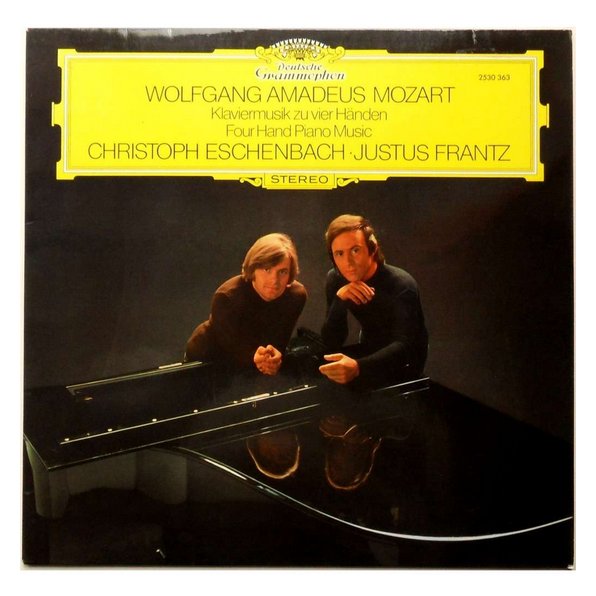 BD: Is there a secret to playing Mozart?
BD: Is there a secret to playing Mozart?
JF: It is a line.
Unfortunately we don’t have a piano here in this room or I would show you!
I would say if there is a secret in playing a slow movement by Mozart that
it is singing. You really make a line, a long phrase, and not separate
each phrase by having it cut at the Schwerpunkt
[the focal point].
BD: You don’t want
a separation?
JF: No, no, no,
no, no. For example, in the slow movement of the Bb Major K. 595, [begins to sing it]
it’s going to the second bar of the phrase, and there is the high point.
But many people and pupils are playing [sings again, showing the lack of
phrasing], and then they already have three chunks. That is absolutely
what Mozart did not want.
BD: So there is
no accent on every bar?
JF: Yes, exactly
yes. No accent, and always, or nearly always, in the music of Mozart
there is an upbeat to himself. For example, every theme that I know
he has written that way. In the A
Major Concerto K. 488, [sings again] it goes to the second bar, and
it doesn’t start [sings, giving an accent on the first beat]. This
is also in the K. 467 Concerto,
which I will play tomorrow.
BD: So it’s always
going someplace!
JF: It’s always
leading to something, yes. That is really a law of Mozart.
BD: So you always
have to look ahead?
JF: Yes.
That propels his architecture
BD: Are there any
other composers who do this same kind of thing with the long line?
JF: No. No
one else is like Mozart doing that, absolutely not.
BD: Why hasn’t
some other composer picked up on it?
JF: Other composers
are more on earth than Mozart. For example, Beethoven is standing with
both feet on the ground, and that’s why he needs more accents. His willpower
is there from the first moment. There is not baroque bowing like Mozart.
BD: Do you find
that Mozart is more in the style of Telemann???
JF: No, I meant
not musical-baroque, but baroque in the way of history. When people
turn and are bowing like this [demonstrates] ...
BD: Using the grand
gestures?
JF: Yes, the grand
gesture, yes.
BD: It is more
elegant?
JF: It is a very
much more elegant, absolutely, yes.
BD: Are people
who are living in the 1990s, who have come through a couple of world wars
and depressions ready for the elegance that Mozart put into his music?
JF: I find it more
necessary than ever to hear the Mozart in this time, when after one year
of hope for all of us, suddenly we come back to the threat of a war.
I was just in the Baltic States, and I looked especially for Mozart, for
concertos for hope. The last concerto, the Bb Major, is a concerto of hope.
I played it just for my friends there because nobody is helping them.
They want to be independent, like they used to be until 1940 when Hitler
and Stalin decided to over-rule them. Since then they’re suffering,
and they need independence like any other country in the world. They
have determination...
BD: And music can
help this?
JF: Yes, yes!
Music can help because what we all need is hope, and this is what he composed;
hope is what Mozart has written there.
BD: Is music in
itself political?
JF: In itself it
is not political. It is too abstract, but it is also humanistic.
That’s what I believe in, and so it always, at least for a moment, can help
people to become better. As long as somebody is listening to Mozart,
he’s not shooting. [Both laugh]
BD: [Pursuing the
point] The same cannot be said if someone is listening to Hindemith
or Wagner?
JF: Well, of course,
yes, yes. The approach of Hindemith or Wagner when they’re understood
rightly also goes into the same direction, but Mozart is maybe the profoundest
of all. For me, at the moment, that is the case.
BD: Was Mozart
not human?
JF: He was very
much human but somehow it appears to me that he had a direct way to also
become an angel, at least in music.
BD: So he’s divine?
JF: He’s a divine
composer, yes, and he has probably a direct transmitter for divine music.
I hope I am communicating my ideas correctly...
BD: They’re coming
across very well. I’m glad you’re able to give your ideas in thought
as well as in music.
JF: I hope I can
do it better in music! [Both laugh]
* *
* * *
BD: Do you like
being a wandering minstrel?
JF: What is a wandering
minstrel?
BD: A performer
who travels all over the world... a jongleur!
JF: [With a big
smile] Oh, jongleur!
Yes and no. Sometimes it’s a little bit too much. Normally I feel
like a musical gypsy going through the world because I’m at home when I have
my keyboard with me. I couldn’t travel so much without music, but with
music it doesn’t take too much effort from me. I feel at home.
BD: The keyboard
that you travel with, it’s not a sounding keyboard is it?
JF: No, no.
It’s a silent keyboard, and of course it cannot replace a piano. But
today, for example, I will go to Orchestral Hall for some hours later on.
To learn a new piece it’s perfect on a silent keyboard because your fantasy
has to be much stronger than just the piano.
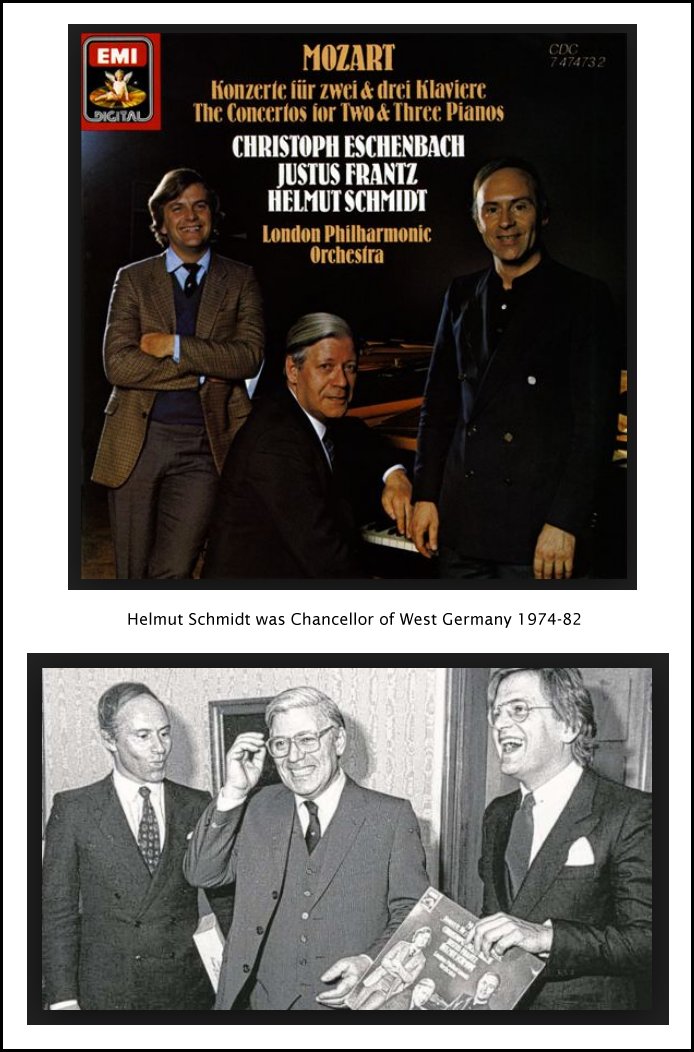 BD: So there is more heart in it?
BD: So there is more heart in it?
JF: Yes, and the
pre-imagination is much clearer.
BD: As you go around
the world you have new pianos to try each time. How long does it take
to make each piano your own?
JF: That’s a difficult
question because I don’t think that every time you can make the piano your
own. Sometimes pianos are using you, and you are playing a different
way than you are used to playing because the piano is in its beauty with
the treble section, so wonderful that you must use that. Even you have
thought about accents in the bass, because the bass is horrible you can’t
do that. So there’s always an inspiration of the piano to yourself,
and you achieve that. You also have the hall with the piano, and again,
in certain ways you try to change a little bit. You have to change,
otherwise it doesn’t work. Sometimes you are better than the piano,
and sometimes you have the feeling that the piano is better than yourself,
and that is the most inspired moment. Very, very seldom, I would say
out of fifty concerts there is just one where you really feel that the acoustics
are such that with the piano you can achieve a hundred per cent of what you
wanted, and everything is fulfilling your wishes.
BD: I assume, though,
that there are times when you achieve things you didn’t think you could do?
JF: Yes, very often.
That depends on some of the beauty of the acoustical of the piano... and
also of the public! They can be an enormous inspiration when you’re
playing a slow movement. When you try to make an enormous tension with
the pause and you suddenly notice that they’re really following, and they
are really appreciating this. You feel the tension in the hall, and
then you are inspired and you are maybe better with this public than you
are alone at home.
BD: Are the publics
different from city to city and country to country?
JF: Oh yes, very
much so. I must say on this tour we had a marvelous Mozartian public
in New York. They were so silent and attentive, and when we really played
a pianissimo there was not one cough.
It was wonderful! In Italy, people are not really wanting much in the
slow movement. They’re much more for the fast movements, and there’s
always a lot of coughing in the slow movement. They’re only waiting
for when it starts to become fast again. In Russia they love Mozart
more than I thought. Maybe they love Mozart the most, at the moment
at least.
BD: [Surprised]
More than Tchaikovsky?
JF: I have the
feeling, yes. We played the last week in Moscow only Mozart, and people
were standing around the Bolshoi Hall half a week in order to get a ticket.
And that is for Mozart! I had the same experience with Sviatoslav Richter
and his December festival in Moscow. There was the same thing, so people
want to listen to Mozart in Russia.
BD: More than just
they want to listen to great music?
JF: Well, I think
there is a contradiction which you don’t mean, because Mozart is great music.
BD: [Smiles]
I mean more than the general picture of great music?
JF: Yes.
Probably they seldom have more than Tchaikovsky or Rachmaninov or the banging
pieces. [Both laugh]
BD: [With a gentle
nudge] Mozart is never bangy?
JF: No, but I don’t
believe in a ‘sugar Mozart’.
I believe in a Mozart which also has both sides, like in these two concertos
I will be playing here, the C Major,
which is full of enthusiasm and of optimism, and then the abstract, contradicting
D Minor, which is abstract and demonic
and full of passion. Sometimes you don’t know where it’s going to go,
but the feeling of death in one concerto and the feeling of life in the other
concerto are the two sides of Mozart, and with all the passion I feel this.
I wrote a lot of cadenzas to these Mozart concertos. Often Mozart didn’t
write one, or we don’t have them. That’s also a big joy to play your
own cadenzas. For the D Minor,
of course you must play the one by Beethoven.
BD: [With mock
horror] You must???
JF: Well, I must!
I never tried to compose my own cadenza for this one because I feel nothing
can ever replace this cadenza that Beethoven wrote. It’s a wonderful
cadenza.
BD: Have you ever
gotten through a work and then decided to improvise your own cadenza as on
the spot?
JF: Yes.
I did it on a tour with a conductor who said to me that he didn’t like the
idea that cadenzas are always the same. So I said to him I would do
something. Just before coming out on the stage, he was to give me a
little theme, and I would improvise and combine it with themes of the concerto.
So we did it, and we started of course with Mozart, and it was very nice.
But then the stupid man started to ask me for things like Sacre du Printemps and even Mathis der Maler. [Both laugh]
We got a very funny review because the critic wanted to know what we did
with the cadenza. Why was it suddenly that modern? But we had
a good time.
BD: But isn’t that
the purpose of the cadenza to improvise?
JF: Yes, it is.
Sometimes I’m doing that, but normally conductors don’t like that because
then they are very frustrated because they don’t know when to enter!
BD: Won’t
they just wait for the trill?
JF: Yes, but this
is something I don’t like so much. I like nice scales when it really
runs into the orchestra, and that is always intimidating enormously for conductors.
I remember once there was suddenly silence after ending the cadenza, and
then suddenly the orchestra came in. After that the conductor was never
very friendly to me!
* *
* * *
BD: How do you
divide your career between solo recitals and concerto performances?
JF: I must say
that I give many more concerts with orchestra. That depends, for example,
on the twenty-seven Mozart piano concertos, which I so much love to play
at the moment, but I only have two programs of Mozart sonatas. I need
much more time in order to play all of the concertos, and we do this in series
in different cities in Europe — Berlin, Munich, London,
Paris, and so on. I would say I play seventy per cent with orchestra
and thirty per cent recitals.
BD: Do you ever
conduct from the keyboard?
JF: I started as
a conductor. I never conducted from the keyboard, but I conducted The Magic Flute in Hamburg nearly fifteen
years ago, and I might conduct again this year. Then I will invite
all my friends, and they will say this is good or not good! I have
a feeling I would like to continue my relationship with conducting.
BD: For a concerto
performance you have yourself and your own ideas, and you have the conductor
with his or her ideas. Are they always in sync?
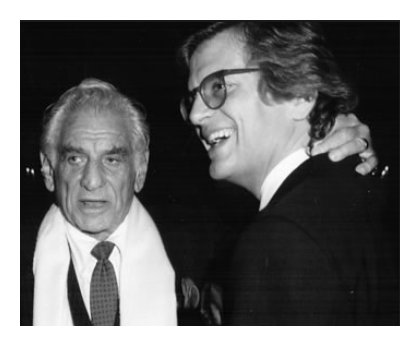 JF: A ‘concerto’ sort of means
competition. ‘Concerta’ means
‘we are fighting together’ for the right thing. I find it very interesting
sometimes if the conductor and the soloist both are not always the same,
that they are striking a little bit, but on a friendly basis, of course.
Then that could really create another sort of tension in the concert, which
would be very nice. With Lenny Bernstein [shown with Frantz in photo at right]
I had this experience very often, because he was a completely different person
in a rehearsal than in a concert. I remember when we did the Schumann
Concerto with the Vienna Philharmonic
for records, we tried to do it, as he said, ‘feverish’! “The
Schumann fever should spread out over the concert,” he said.
But then in the concert suddenly he was half as fast, or doubly as slow than
in the rehearsal!
JF: A ‘concerto’ sort of means
competition. ‘Concerta’ means
‘we are fighting together’ for the right thing. I find it very interesting
sometimes if the conductor and the soloist both are not always the same,
that they are striking a little bit, but on a friendly basis, of course.
Then that could really create another sort of tension in the concert, which
would be very nice. With Lenny Bernstein [shown with Frantz in photo at right]
I had this experience very often, because he was a completely different person
in a rehearsal than in a concert. I remember when we did the Schumann
Concerto with the Vienna Philharmonic
for records, we tried to do it, as he said, ‘feverish’! “The
Schumann fever should spread out over the concert,” he said.
But then in the concert suddenly he was half as fast, or doubly as slow than
in the rehearsal!
BD: So it was completely
different?
JF: It was completely
different, and I was really shocked. It came out later on when we heard
it on the tapes. We couldn’t combine anything from the concert with
the rehearsal, but it was marvelous because somehow you could feel the tension
between conductor and soloist. It was a fight for the right tempo!
BD: [Playing Devil’s
advocate] So why do you rehearse if you’re going to change
things around in the concert?
JF: Well, that’s
a good question. [Both laugh] In this case Lenny was absolutely
contrary of Karajan. Karajan was very difficult to rehearse with, but
then he was so reliable and he was just fulfilling what one time he had done.
Lenny was swept away by new ideas and by wonderful new fantasies, and so
everything could be changed. So both sides were wonderful, and great
gifts into my life experience.
BD: It seems that
those two conductors are opposite ends of the spectrum.
JF: Absolutely,
for me, yes they were.
BD: And yet you
could deal with both of them?
JF: Yes, of course.
With great things, one always wants to deal. They were both great characters.
BD: Tell me about
the Schumann Concerto. Is
that a special for you, or is it just another concerto?
JF: I don’t have
such things like ‘another concerto’. Always these are friendships which
are lasting for the whole of my life. The Schumann Concerto is a piece which I heard the
first time from the last pupil of Clara Schumann. That was a grand
aunt of mine, who was a pupil of Clara Schumann. I remember I was five
or six or seven years old. It was just the beginning of the ’50s,
and she was still alive. She was nearly 100, and she played the Schumann
Concerto and very much other of
his music. That was an enormous impression on me. From this moment,
Schumann’s music has always accompanied my life. I feel the obsession
in Schumann. I feel his fear and his humanity. Schumann is a
composer I really would have loved to become a friend because somehow I feel
enormously sympathetic with him. I am a Schumann-being! [Both
laugh at the pun]
BD: Do you feel
you could have rescued him from his madness?
JF: I would give
everything to do that, but no. In his diary and in his letters and
mostly in his music, it’s so full of heart. Even little phrases are
so full of poetry, which somehow touches me very much. And when he
becomes ill, his music brings me into tears. Such a piece like the
Requiem, or other very late pieces,
when he really has difficulties to find forms and to express himself and
find the right orchestration, somehow it is like seeing someone you love
getting older and becoming feeble. Such a feeling I have with his music.
BD: Have you given
any thought to playing any of Clara’s music?
JF: I was thinking
to play her Piano Concerto.
Maybe I’ll be able to do this sometime.
BD: It would be
interesting to see what you could bring to that, or what you could find within
the score.
JF: Yes, but at
the moment I’m on the way through the world of Robert. I think about
how long I will still be in this world.
BD: It would be
interesting to see if you could find the relationship between his music and
her music, and the influences back and forth.
JF: Yes, yes, absolutely.
There are the Variations on a Theme by
Clara Wieck. Maybe some dreams are ending when they are fulfilled!
[They both laugh again]
* *
* * *
BD: Let me ask
the big philosophical question. What’s the purpose of music in society?
JF: That’s more
a sociological than a philosophical question. For me it’s quite easy.
I became a musician because I need spiritual meanings in this world, and
for me music is the language of God. I find God by making music, and
I need this. I find that in a world which is overflowing with information
and by consumerism, it is so eminent. It is necessary also to have
a world which never can be materialistic, and that’s why music is maybe more
important for all of us than it was ever before.
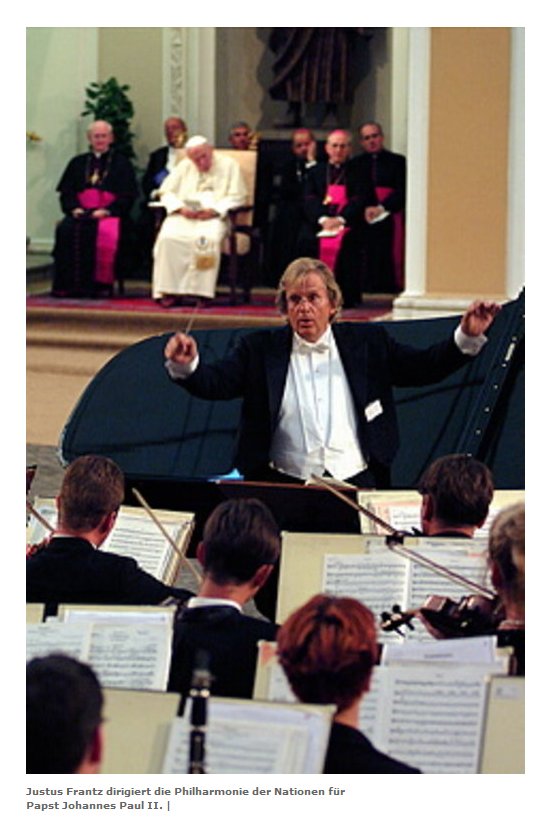 BD: Do you feel that you’re a musical missionary?
BD: Do you feel that you’re a musical missionary?
JF: I feel that
everybody who is listening to music is listening to a sort of mission, yes.
BD: Is it your
mission, or is it Mozart’s mission?
JF: I don’t know.
I think it is a mission which is the beginning. From the Bible, “In
the beginning was the Word,” and that was the sound
and was the logic. I find that music is the expression of this law
of construction of the cosmos.
BD: Do you feel
that all of the great music in the world comes directly from God?
JF: Yes, I feel
that. I believe music is always under these laws, and so I actually
feel we are all interested in what composers were doing during their lifetime.
But whether Wagner was wearing a beret or not doesn’t make any difference.
The music is somehow a miracle that through him came to birth and to the
world.
BD: Does that miracle
continue today with the composers who are righting now?
JF: I hope that
is the case. It is very difficult for us to speak about that because
it is too new. But I would say that composers like Ligeti, like Schnittke,
maybe Berio, to name
three of them, are composers which also will last for a long time, and also
will be under these laws.
BD: Do you play
some of this new music?
JF: Yes.
I played music by Ruzicka [photo of CD
booklet shown later on this webpage], by Henze, by Stockhausen and
Schnittke... not so much in this moment, since Mozart is such an enormous
amount of work. The new scores are not striking me in the moment very
much, but normally I do play some.
BD: Do you feel
that the spirit of Mozart is applauding the new efforts?
JF: I hope so!
[Both laugh]
BD: Let’s talk
a little bit about your festival in Schleswig-Holstein.
JF: Schleswig-Holstein
was born as different festivals, because different festivals have their own
spirit and also sometimes their own mistakes. In Europe, music is much
more of an elite class than in America. If you are in Berlin you have
this avenement [advent, coming].
For example, every second Monday you are always listening to the Berlin Philharmonic.
BD: Oh, a series?
JF: A series to
which you are subscribing, yes. We call that avenement, and normally in cities we have
a very old public because you get it passed to you from your dead father.
You get the second Monday series, and you give it to your son, and so on,
and so on! In Salzburg the prices are immensely high, especially for
young people, and so I thought that ours must be a festival which is little
bit similar to Tanglewood or Blossom, or even here the Grand Park concerts
in Chicago. So we spoke with Lenny Bernstein about this, and we thought
we must combine different things. We must found a school which brings
different, wonderful teachers from all the world to Schleswig-Holstein, which
was the place actually we spoke about back then. We must bring an orchestra
together with youngsters from all over the world to create and to show as
a symbol for a world that could do much better if it would be more symphonic.
We should like to bring young musicians and give them the same platform like
the big stars of music. That was all very difficult to create, but
it worked out. We had 250 concerts which were sold out normally, but
if we had a long line of people, we just opened the doors and let them in.
That was good for the spirit. Midori was there, as was Vengerov, and Kissin
was there for the first time outside of Russia. He was in the first
concert, and everybody knew that a new star from Russia was born. So
throughout these years the youngsters created an enormous interest, and they’re
not playing for a small public or just your family — which
is so frustrating for young musicians — but for a really
big audience. We have the same amount of people that Lenny Bernstein
has. We also want to bring modern music. Lenny conducted for
20,000 people things like Sacre du Printemps.
Beethoven’s Fifth Symphony for 20,000
is nothing, but Sacre, and then the
Fifth of Sibelius, these are not
pieces for the general public, but they were enormously accepted. So
this festival is now ready, a very nice part of the big European festival
scene. We didn’t want to add just another festival. We wanted
to do something which others are not doing. We want to bring the youth
aspect — education, modern music, young composers,
young instrumentalists. We want to make it as part of the villages,
to bring music we have not only to people flowing in from Salzburg and New
York, but also we want to do it for the farmers and for the people in the
villages. That sort of modern musical democracy has worked out.
BD: So you feel
that concert music is for everyone?
JF: Of course,
it’s for everyone. It would be as stupid to say it should only be for
the inner circle! It is like a religion, and how could we ask people
not to go to church? It must be open for everybody, yes.
* *
* * *
BD: I want to come
back to the idea of recordings. Do you play the same in the recording
studio as you do in the concert hall?
JF: The question
in recording studios is how often do you have to play something and always
be inspired by it. For example, we had sometimes in a recording enormous
problems with woodwinds. They were out of tune, and so I played three
bars and they were already too low or too high. That was going up and
down, and we had to repeat and repeat it. After a while I said I don’t
want to do that anymore because twenty times, or a hundred times, you cannot
say ‘Ich liebe dich’ with the same
passion. It’s only the surface, but it’s not deep and profound anymore.
BD: And yet in
a concert, if there’s a little bit which is out of tune you just have to
go right on.
JF: Yes, and sometimes
it matters so much more. But of course a recording engineer is looking
for surface that must be perfect. We, the public and the artists, are
looking more for the profoundness of interpretation.
BD: What about
during a solo recital when you are the only one there?
JF: Then I like
very much to do it in a recording studio because you can stop if you feel
you are getting tired, or you’re not that inspired. Then some hours
later you start again, and hopefully the enjoyment and the joy of music will
be bring you to new inspiration.
BD: Are you pleased
with the recordings that have been issued of your music?
JF: That is a difficult
question. If I say no, then it’s not good, and if I say yes, it’s immodest.
But I would say I think that’s what I wanted to do, at least with the Mozart
and with the Dvořák and the Beethoven Emperor.
BD: Tell me about
the Dvořák Concerto.
JF: The Dvořák!
Dvořák has written a piano concerto that really
is extremely difficult to play because Dvořák
was not a pianist. He wanted to sound like Brahms, but he didn’t know
how to do it. So it’s very combined like a cello with a violin, and
he wanted the piano to be banged like Brahms or Tchaikovsky, and that is nearly
impossible. So even it’s harder than a Brahms concerto.
It doesn’t transmit to the public, and so pianists don’t like to play it
so much because nobody knows how much work is in it.
BD: And yet you
have to bring this music to the public.
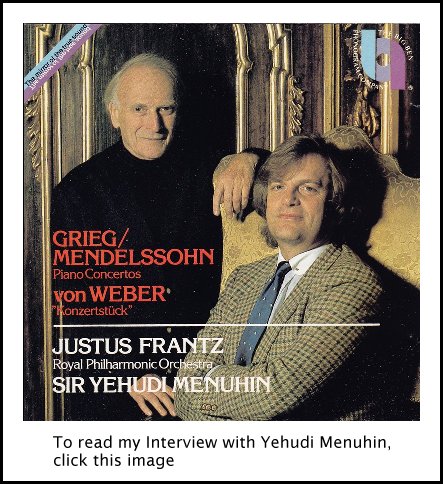 JF: Yes, but I love this piece. It’s very
unfortunate that it is forgotten by so many pianists. I find it in
the ranking of Romantic piano concertos beside the famous concertos like
the Brahms concertos, the Tchaikovsky, the Grieg, the Schumann... [pauses
to think]
JF: Yes, but I love this piece. It’s very
unfortunate that it is forgotten by so many pianists. I find it in
the ranking of Romantic piano concertos beside the famous concertos like
the Brahms concertos, the Tchaikovsky, the Grieg, the Schumann... [pauses
to think]
BD: The Beethovens?
JF: Beethoven?
You think Beethoven is a Romantic? I leave him to the Classic Period.
BD: I thought at
least the last two concertos would be into Romantic realm.
JF: Yes, maybe.
I also play Beethoven, but I’m speaking about the second half of the last
century. The Dvořák Concerto for me really comes much before
Liszt. I find it much more musical, much more honest and finer than
the Liszt concertos. But of course if you play Liszt, you get a standing
ovation you never get with the Dvořák.
[Both laugh]
BD: Is the public
missing what is in the Dvořák?
JF: Maybe it is.
It’s such a big orchestra. The piano, as I said, has not the banging
octaves. It has a lot of other difficulties, but when it does not create
the big sound, maybe sometimes they don’t listen. Maybe they cannot
hear you the subtleties. I don’t know. I really only hear this
piece from the stage or from the records, but the first movement has great
architecture. It’s great symphonic work, a wonderful sonata movement.
The second movement is a wonderful creation, and the third is like a picture
book of Slavic countries with its beautiful themes. Of course the last
movement with its different Slavonic themes is very long, and so George Szell,
for example, tried to do it with a short cut, which I found I don’t like,
I must say.
BD: You don’t like
the cut?
JF: No, absolutely
not. I like every note from the first single note to the last.
Maybe the other way is more successful, but I like my way better.
BD: [With a gentle
nudge] You like Dvořák’s way better?
JF: Yes, that’s
right, yes, yes, very right. [Both laugh]
* *
* * *
BD: Is there a
competition amongst pianists in the world?
JF: [Thinks for
a moment] Actually if you are speaking of playing faster and louder,
then there would be a competition. But in a way that a music should
come to be given by an individual soul to the other individual souls, then
there is no competition because there is not, for heaven’s sake, a competition
between souls. This kind of competition, which apparently we are all
accused of, is not for me.
BD: You’re also
teaching at the Hochschule?
JF: Yes.
BD: Is this piano
technique or repertoire, or what?
JF: We include
all of this. I’m teaching piano technique and repertoire in what we
call a masterclass, and I’m also teaching sometimes management through the
festival. Our young artists can come and help in the festival so they
learn something about the organization of the musical world. That way
they’re a little bit more self-determined, and they know better what they
want and are not simply delivered to the power of the big managers.
BD: Like lambs
to the slaughter!
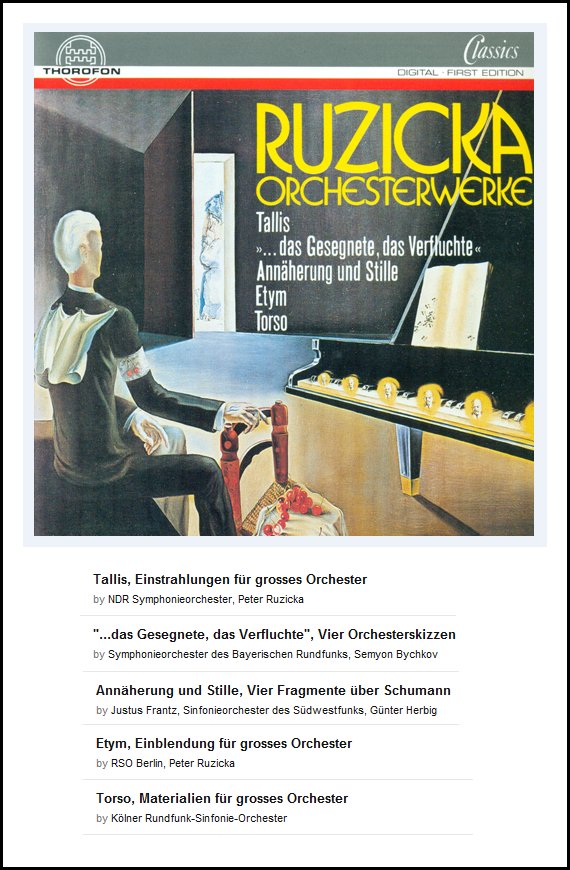 JF: [Laughs] Yes!
JF: [Laughs] Yes!
BD: What advice
do you have for young pianists coming along today?
JF: I would say
the most important thing is that we must strike against the danger of the
electronic media which makes products that are clean and perfect by using
many takes and cutting the best parts together. In a concert you can
try to be the same as on the recording, but then very often it destroys the
profoundness of music. It’s wonderful if you can do it, but it’s not
the main point. The main point is that you have a birth of fantasy
and of temperament, and that must be striking. It is much more important
to show the great architecture of music. Beethoven had one pupil, and
he delivered a very famous word of Beethoven. He played at one time
the Appassionato to the composer,
and it was perfect. Not one wrong note. Beethoven was listening,
and then he said, “But really nothing happened!”
That is sometimes unfortunately what is appearing for us in concerts today
— nothing happens. Everything is
clear and not one false note happens, but also there is nothing of the soul,
of fantasy, of striking new things in the concert.
BD: So the performer
should make something happen?
JF: Yes, and the
biggest danger we are confronted with at the moment is the sterility of concerts.
That is because we try to imitate. We don’t try to follow the great
moments of art, but we follow great records, and that is not good, of course.
We must be performers, not record reproducers.
BD: [With a sly
grin] Then why do you make records?
JF: Yes!
[Both laugh] The last record I did, I made in concert, and even this
is, hopefully, not for being repeated by others. Maybe it can inspire
somebody to do something new. That would be wonderful, but I don’t
want to have pupils who are doing exactly the same things I did, because
everybody is different.
BD: Is playing
the piano fun?
JF: Yes, a lot
of fun, yes. Yesterday, for example, I felt very bad in my body.
I had a very bad migraine headache, but I played Mozart, and from movement
to movement I felt better, and at the end I was cured.
BD: Mozart has
therapeutic value!
JF: Yes, but not
only Mozart. When I am in a depression, and I play sometimes Beethoven.
You can’t have a depression after having played the Emperor Concerto. You must be as
if the music came to your heart and your soul. Then you must be a proud
and vital human being after having played this work. I don’t understand
musicians who are always so exhausted after a concert because I feel music
gives you so much strength that I’m much better after a concert. We
could repeat this interview then, and you would see I know much better English
than I do now!!! [Both laugh]
BD: You’re keyed
up?
JF: Yes.
BD: I’m glad the
music gives you so much.
JF: Yes.
BD: Then you give
that to the audience?
JF: Yes, that’s
at least what I try, and in good moments that’s what happens.
BD: Thank you for
being a pianist. Thank you for being a musician.
JF: Thank you.
=======
======= =======
======= =======
-- -- -- -- -- -- -- -- --
======= =======
======= =======
=======
© 1991 Bruce Duffie
This conversation was recorded in Chicago on February 20, 1991.
Portions were broadcast on WNIB the following day, and again in 1994 and
1999. This transcription was made in 2015, and posted on this website
at that time. My thanks to British soprano Una Barry for
her help in preparing this website presentation.
To see a full list (with links) of interviews which have been transcribed
and posted on this website, click here.
Award -
winning broadcaster Bruce Duffie was with WNIB, Classical 97
in Chicago from 1975 until its final moment as a classical station in February
of 2001. His interviews have also appeared in various magazines and
journals since 1980, and he now continues his broadcast series on WNUR-FM,
as well as on Contemporary Classical Internet Radio.
You are invited to visit his website
for more information about his work, including selected transcripts of other
interviews, plus a full list of his guests. He would also like to call
your attention to the photos and information about his grandfather,
who was a pioneer in the automotive field more than a century ago.
You may also send him E-Mail with
comments, questions and suggestions.



 Justus Frantz: I founded that orchestra, the German-Soviet
Youth Orchestra. It’s a very good orchestra. You see, we were
always enemies, and suddenly we were together with the music, and it was
such an enjoyment. Everybody tried to be better. The recording
is of the whole concert, even with the National Anthems! Being a concert
we have no chance to repair it! [Both laugh]
Justus Frantz: I founded that orchestra, the German-Soviet
Youth Orchestra. It’s a very good orchestra. You see, we were
always enemies, and suddenly we were together with the music, and it was
such an enjoyment. Everybody tried to be better. The recording
is of the whole concert, even with the National Anthems! Being a concert
we have no chance to repair it! [Both laugh]  BD: Is there a secret to playing Mozart?
BD: Is there a secret to playing Mozart? BD: So there is more heart in it?
BD: So there is more heart in it? JF: A ‘concerto’ sort of means
competition. ‘Concerta’ means
‘we are fighting together’ for the right thing. I find it very interesting
sometimes if the conductor and the soloist both are not always the same,
that they are striking a little bit, but on a friendly basis, of course.
Then that could really create another sort of tension in the concert, which
would be very nice. With Lenny Bernstein [shown with Frantz in photo at right]
I had this experience very often, because he was a completely different person
in a rehearsal than in a concert. I remember when we did the Schumann
Concerto with the Vienna Philharmonic
for records, we tried to do it, as he said, ‘feverish’! “The
Schumann fever should spread out over the concert,” he said.
But then in the concert suddenly he was half as fast, or doubly as slow than
in the rehearsal!
JF: A ‘concerto’ sort of means
competition. ‘Concerta’ means
‘we are fighting together’ for the right thing. I find it very interesting
sometimes if the conductor and the soloist both are not always the same,
that they are striking a little bit, but on a friendly basis, of course.
Then that could really create another sort of tension in the concert, which
would be very nice. With Lenny Bernstein [shown with Frantz in photo at right]
I had this experience very often, because he was a completely different person
in a rehearsal than in a concert. I remember when we did the Schumann
Concerto with the Vienna Philharmonic
for records, we tried to do it, as he said, ‘feverish’! “The
Schumann fever should spread out over the concert,” he said.
But then in the concert suddenly he was half as fast, or doubly as slow than
in the rehearsal! BD: Do you feel that you’re a musical missionary?
BD: Do you feel that you’re a musical missionary?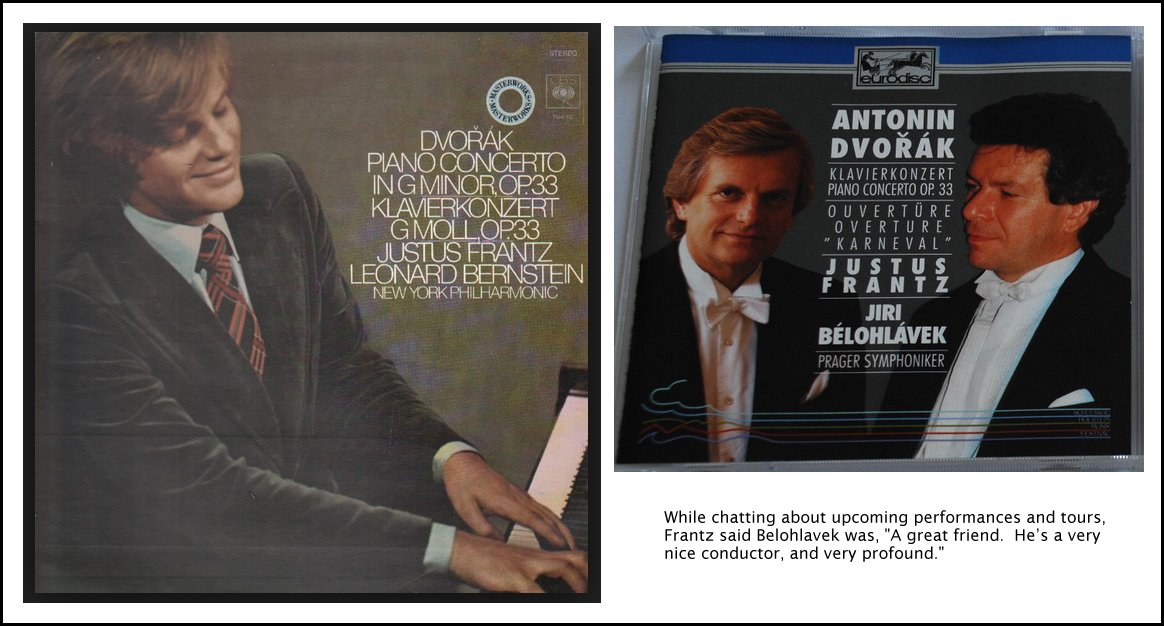
 JF: Yes, but I love this piece. It’s very
unfortunate that it is forgotten by so many pianists. I find it in
the ranking of Romantic piano concertos beside the famous concertos like
the Brahms concertos, the Tchaikovsky, the Grieg, the Schumann... [pauses
to think]
JF: Yes, but I love this piece. It’s very
unfortunate that it is forgotten by so many pianists. I find it in
the ranking of Romantic piano concertos beside the famous concertos like
the Brahms concertos, the Tchaikovsky, the Grieg, the Schumann... [pauses
to think] JF: [Laughs] Yes!
JF: [Laughs] Yes!